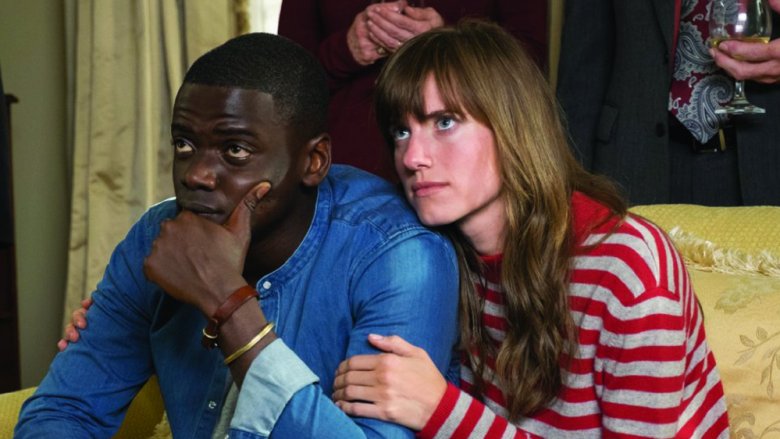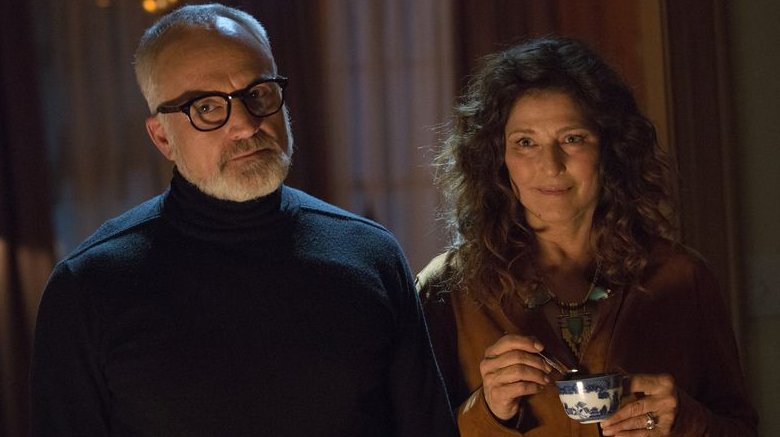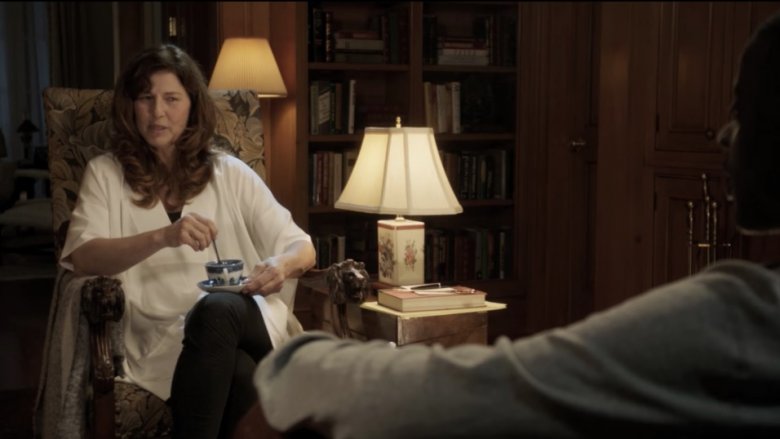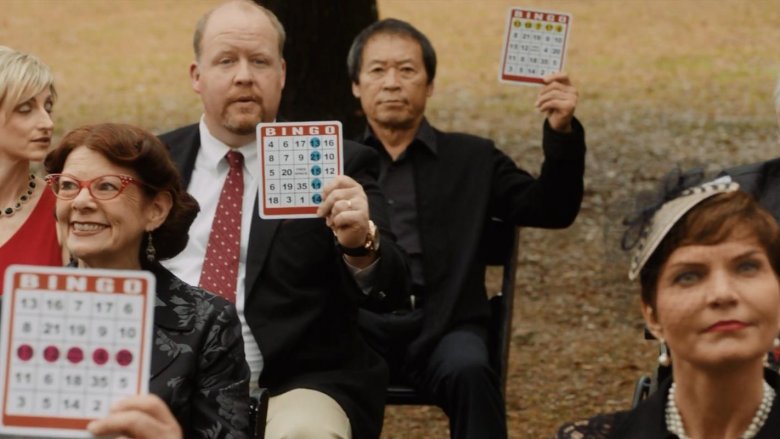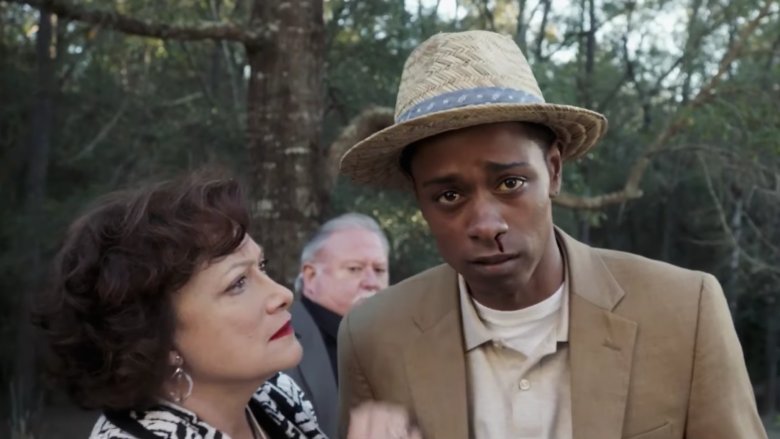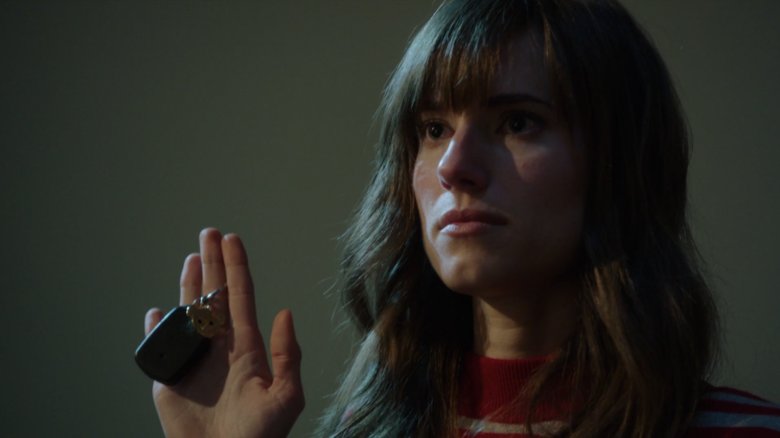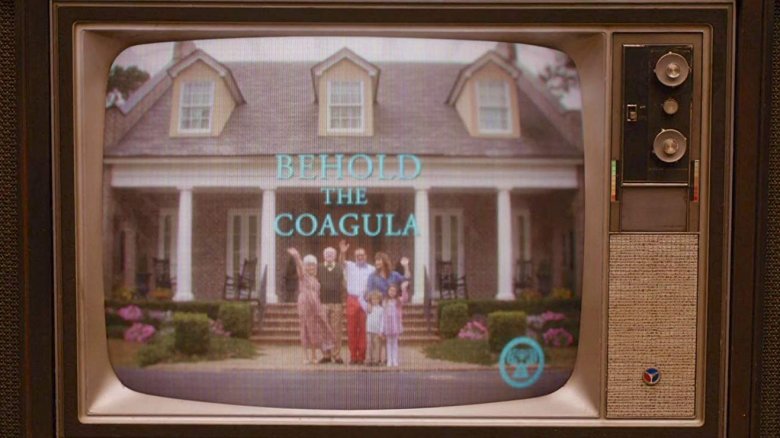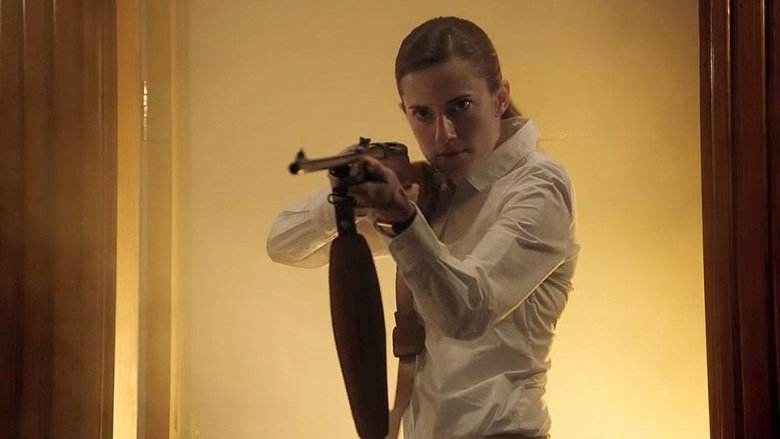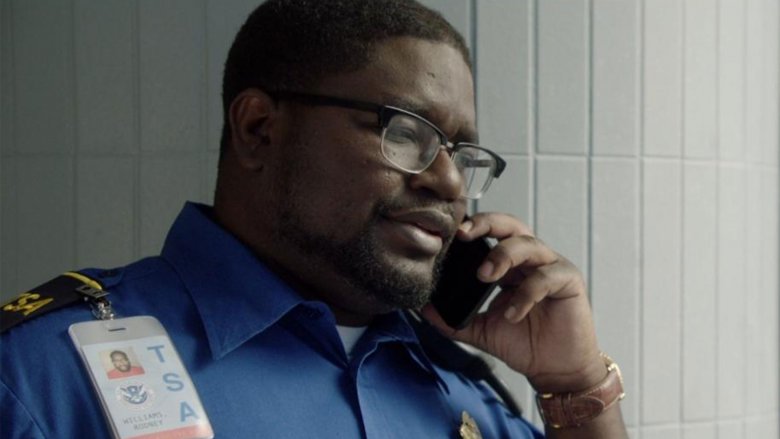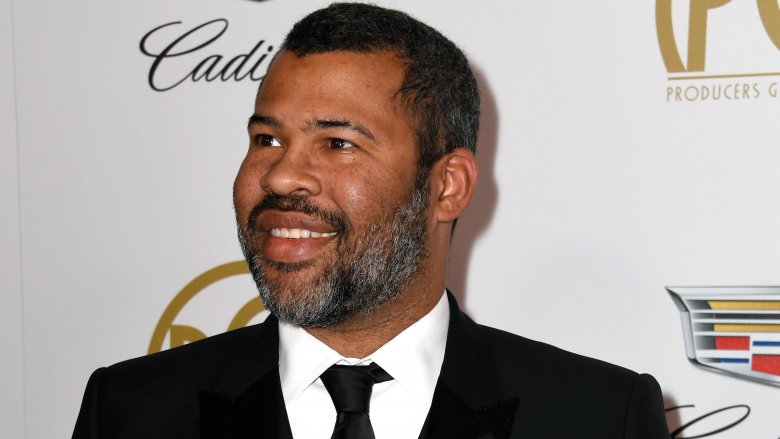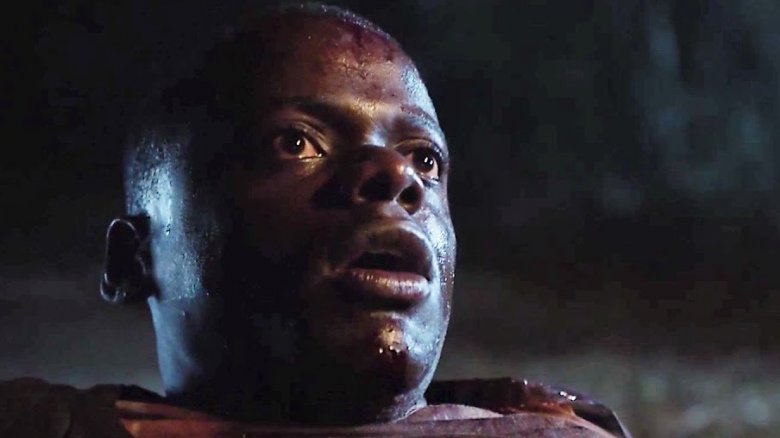Get Out's Ending Explained
Get Out was the most profitable film of 2017. According to Box Office Mojo, this comedy-horror masterpiece was made for just $4.5 million, and went on to earn more than $255 million worldwide. The film's success reintroduced the social thriller genre to a wide audience. With its pitch-perfect satire, razor-sharp wit, and edge-of-your-seat suspense, Get Out earned writer/director Jordan Peele an Academy Award for Best Original Screenplay, making history as the first release by a black screenwriter to win that particular Oscar.
How did this low-budget, genre-bending movie earn more than a 630% return on investment, and a 98% rating on Rotten Tomatoes, while becoming a cultural touchstone for a generation? Peele's vision was to distill the casual racism that minorities deal with on a day-to-day basis into a genuinely terrifying experience for moviegoers. "It was very important to me to just get the entire audience in touch in some way with the fears inherent [in] being black in this country," he explained. "Part of being black in this country, and I presume being any minority, is constantly being told that... we're seeing racism where there just isn't racism." Peele expertly uses all-too-common micro-aggressions as the narrative cover for a much more sinister reveal lurking beneath the surface. With all that in mind, here's a look at where the story leads in the final act — and the ending of Get Out explained.
Rose's parents foreshadow the ending
The ultimate reveal at the end of Get Out doesn't necessarily spin your head, but the why of the plot is every bit as earth-shattering as an M. Night Shyamalan-style twist. The difference here is that the ending is so organically earned and germane to the plot that the weight of it can be hard to perceive on first viewing. When interracial couple Rose (Allison Williams) and Chris (Daniel Kaluuya) first set out to meet Rose's parents, Chris is apprehensive. Rose has told him that he's the first black guy she's ever dated. "This is uncharted territory for them. You know I don't want to be chased off the lawn with a shotgun," Chris jokes.
When Chris meets Rose's parents Missy (Katherine Keener) and Dean Armitage (Bradley Whitford), Chris' (and the audience's) fears are momentarily assuaged by pleasantries and platitudes. "By the way," Dean says, "I would have voted for Obama for a third term if I could." Dean virtue signals that he's an ally, with a deflection so commonplace it plays as a laugh line here. That punchline obscures for the audience two important pieces of information that come before it. Firstly, Dean discusses how his father lost to Jesse Owens, a black man, in the 1936 Olympics. Secondly, he mentions how it must be strange to see a white family with black servants. So, in sequence, as foreshadowing, we have a reference to the stereotypical perception of blacks as superior athletes, and then a reference to a black man and woman working in service of a white family. The Obama joke deflects what will become key clues as to what exactly the Armitages are up to.
Hypnostism and 'The Sunken Place'
After being hypnotized against his will by Rose's therapist mother Missy Armitage, Chris is introduced to the "The Sunken Place." What exactly is the Sunken Place? Ostensibly, it's a brainwashing format. Jordan Peele hoped that the audience would see it as more than that. "We are all in the Sunken Place," Peele tweeted. "We're marginalized. No matter how hard we scream, the system silences us."
Chris feels culpable for his mother's death — a car accident that left her alone, slowly dying for hours. Missy uses this bit of information about Chris' psyche to lure him into the Sunken Place, and it's the first hint that Missy's parents know more about Chris than they've let on. During Chris' first visit to this paralyzing state of mind, our suspicions that the Armitages are kidnapping and brainwashing black men are seemingly confirmed. But the audience is left to wonder — to what end? Early on the how is apparent, but it's not until the end, during Chris' final visit to the Sunken Place, that the why is revealed.
Racist comments at the garden party
Several more examples of (ever so slightly) more subtle stereotypes covering up overt racism appear at the Armitage garden party. The family's wealthy friends arrive and chat up Chris and Allison with questions and comments that fetishize and demean the imagined athletic and sexual prowess of black men. A woman grabs Chris' bicep and comments on how strong he must be, before asking Rose if sex is really different with a black man. Another couple declares, "Black is in fashion!"
While Chris and Rose take a walk, we see the party playing a game of "bingo," an auction that has the partygoers seemingly bidding on Chris. Earlier, Chris' friend Rod theorizes that Missy Armitage is not just a therapist, but rather a hypnotist brainwashing black people into becoming sex slaves. Up to this point, it's what the audience is led to believe as well. Rod warns Chris that he's wandering into an "Eyes Wide Shut situation!"
The flash
In the film's cold open, Lakeith Stanfield's character, Andre Hayworth, is abducted. When the character resurfaces, it's at the garden party, though he's quite different in appearance and carriage. In the film's opening, we see a person who wears cool clothes and comports himself like a normal guy. At the garden party, he's dressed in a straw hat and slacks not even your dad would wear. Chris thinks he recognizes him, but when he engages in conversation he's met with empty eyes — and his fist bump is met with an awkward hand grab.
Chris attempts to snap a picture of Andre to send to his friend Rod, but when his camera flashes, something unexpected happens: The flash triggers some kind of mental crash in Andre. He gets physical with Chris and desperately tells him to "Get out!" The flash is significant because it signals to the audience that there's still some portion of the brainwashed person's psyche intact. This is a fact that heightens the horror of the situation — the implication being that the small part of the psyche that remains is semi-conscious, but utterly helpless. Chris manages to get the photo of Andre to Rod, who identifies Andre as their mutual acquaintance — now a missing person. This is brought to light as Chris finds a box of photos of Rose, who has supposedly never dated another black guy, posing romantically with many other young black men and one black woman. Chris realizes he's in danger and tries to make a run for it, but finds that Mrs. Armitage's hypnotism has left him powerless to leave of his own volition.
Rose's true nature
Once Chris finds those pictures of Rose, he understands that he's in danger, but he's still unable to see Rose's part in the scheme. Perhaps blinded by his love — and Rose's expert level double-agent abilities — he attempts to include her in his exit strategy. However, there's a problem: their car keys are missing. As she rifles through her purse, seemingly desperate to find those keys, her brother Jeremy blocks the door and her father Dean monologues about being "gods."
Chris repeatedly asks Rose, "Where are those keys?!" He does so even as the audience can see him beginning to realize that Rose may not be the victim he believes her to be. Rose responds, "You know I can't give you the keys, right babe?" She holds up the keys, dead-eyed and stone-faced, revealing herself to Chris as complicit in the plot. When Missy taps the spoon on her teacup, Chris is sent back to the Sunken Place.
The Order of Coagula
As Chris awakens, paralyzed in a chair, an old television lets Chris know the fate that awaits him. A video of a spoon making the soothing hum as it spins around Mrs. Armitage's tea cup, Chris' hypnosis trigger opens the broadcast. It reveals that the Armitage family is not merely brainwashing black men, as the audience has been led to believe. They are in fact members of a cult called the Order of Coagula, originally led by Rose's grandfather — the one mentioned in the beginning as having lost to Jesse Owens at the Olympics.
The video goes on to say that the Order of Coagula had developed a method of life extension through brain transplantation. Young black men were sought, not only for their youth, but for their perceived superior physical traits. The black men are lobotomized, preserving only the parts of their brain that preserve motor function, and a shadow of the host's consciousness, forever doomed to reside as a paralyzed passenger in its own body. Their brains are replaced with the partial brains, and dominant consciousness, of rich, old white men interested in immortality. Chris, unable to move, is made aware that the blind art dealer he met at the garden party was to take over his body.
The escape
Peele has established, as a seeming surface-level throwaway detail, that Chris' response to hypnosis is to panic scratch at the chair's upholstery. This winds up being his saving grace. Chris is able to pull some cotton from the chair he's been confined to and stuff it in his ears, to deafen himself to the hypnotizing sound of the spoon and tea cup trigger. He feigns being paralyzed, stuck in the Sunken Place, waiting for his opportunity to attempt an escape. After dealing with the Armitages, Chris gets in the car and makes tracks. In this sequence, we see the final appearances of Walter and Georgina, the family's servants. It's been revealed that the servants are, in fact, Rose's grandparents, transplanted to new bodies.
When Chris begins his escape, he inadvertently runs down Georgina in the car. Seeing her in her sorry state reminds Chris of his mother, who, as the audience knows, he feels he abandoned after she had a car accident years ago. Overwhelmed by guilt, he loads Georgina in the car. Alas, Georgina is a facade for Rose's grandmother. She attacks Chris, causing him to crash, and the impact kills Georgina. As Rose closes in on Chris with a rifle at the ready, Walter, a.k.a. Rose's grandfather, makes his final appearance, tackling Chris. Chris remembers "the flash" incident with Andre, and flashes Walter with his phone. This temporarily brings forth the original Walter's consciousness, who shoots Rose and then shoots himself in the head.
Rod to the rescue
Rose, lying on the ground dying, claims she still loves Chris. She hopes he'll rescue her. He sees through the gambit, and begins to strangle the last breath out of her, but can't bring himself to continue. As he lets up on Rose, we see a police car's red and blues flashing. This is potentially the second police encounter of the film. In the first, early in the film, Rose and Chris are pulled over for a broken taillight. Despite the fact that Rose is driving, the police officer asks to see Chris' ID and he hands it over, sadly accustomed to being profiled by the law.
Rose comes to Chris' defense, a ploy that gets the audience on Rose's side early in the film, allowing us to feel, along with Chris, the weight of the revelation that she too is complicit in the film's big reveal. So when the police lights flash in the movie's final moments, we fear that Chris will be railroaded into prison by a bigoted police officer. Luckily, it isn't a police car, but rather a TSA vehicle driven by Chris' pal Rod.
Alternate ending
The movie could've ended quite differently. The theatrical release gave us some sense of closure and justice, but the alternate ending included on the Get Out DVD is as mind-blowing as it is horrifying. In the deleted ending, it's not Rod who turns up to save the day. It's the police — just as audiences initially feared. In the scene, Chris is arrested. Rod visits Chris in prison, where Chris explains that he can't recall the details of the events that would prove him an innocent victim. The movie ends with Chris accepting his fate, happy in the knowledge that he "stopped it."
In the director's commentary, Jordan Peele says "This movie was meant to call out the fact that racism is still simmering underneath the surface, so this ending to the movie felt like it was the gut punch that the world needed, as something about it rings very true."
The ending's deeper meaning
The film played with the audience's expectations involving genre and narrative structure. It revealed clues as minor details that were paid off in the third act brilliantly, and the message of the movie was intrinsically connected to its ultimate twist. The Order of Coagula are not the kind of societal outcast racists that are usually depicted in movies. The racists in Get Out weren't running around shouting "White Power!" in faceless hoods. These were socially accepted, otherwise-upstanding-citizen racists, who kept their true evil hidden by falsehoods and platitudes.
By revealing these liberal whites' professed admiration for the black race as fetishistic and opportunistic, Peele scratched at an unspoken, larger truth that resonated with audiences worldwide. Using the micro-agressions that people of color deal with in their everyday lives as the signals for more sinister motives, Peele created a story that succeeds as a thriller as well as a pointed social commentary.
